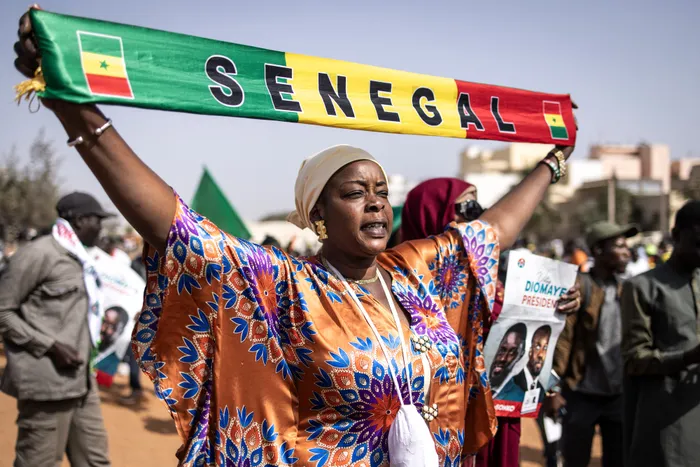Seeking political stability as 20 countries prepare for polls

A demonstrator holds a scarf during a march in Dakar on March 2, against the new amnesty law and for elections to be held before April 2, 2024. The constitutional council has ruled against President Macky Sall’s last-minute deferral of the February 25 presidential election, plunging the traditionally stable West African country into its worst turmoil in decades, and the president has since announced elections for March 24, 2024. – Picture: John Wessels / AFP / Taken on March 2, 2024
By Nkanyiso Simelane
Twenty African countries are scheduled to hold presidential or national elections this year. In other words, more than 37 percent of African countries will be electing leaders to govern for the next electoral terms.
The large scale of elections poses challenges and opportunities for political stability on the continent.
Of the 20 elections, 30 percent will be in southern Africa, 25 percent in West Africa, 20 percent in North Africa and 10 percent in central Africa.
The respective Regional Economic Communities (RECs) will be tasked with managing peace and security situations and will also be involved in observation missions to aid states in conducting elections according to their protocols and those of the African Union (AU).
The first, and only, election to be held so far has been in Comoros on January 14. The country’s electoral commission declared President Azali Assoumani the winner, with 62.97 percent of the vote. However, the Comoros Supreme Court validated that the president had won with 57.2 percent of the vote.
This fuelled perceptions from the opposition parties that the election might have been fraudulent. Subsequently, there were protests with widespread destruction of property. A curfew was announced on January 18 in an attempt to quell the unrest.
Another incident of an election-related protest was in response to the postponement of the Senegalese presidential elections scheduled for February 25. However, the president announced a postponement until December because of challenges with the selection of electoral candidates.
Opposition parties expressed their disapproval in parliament, alleging that the president was attempting to extend his term and delay the election.
Subsequently, citizens staged protests to express their disgruntlement, which caused political instability in the relatively stable West African country. The president has since changed his decision after a judicial intervention.
The two case studies depict the importance of having elections perceived as free and fair by the winners, losers and the citizens. The cases also highlight the impact that elections can have on political instability within the broader governance, peace and security nexus.
The two cases must be viewed as serious warnings for all stakeholders to contribute towards more peaceful and stable elections.
Amu
Looking at the regional distribution of Africa’s elections, the Arab Maghreb Union (Amu) has all but one of its member states heading to the polls this year, making it a ratio of 80 percent of its member states. Mauritania’s election will be conducted on June 22; Algeria, Libya, and Tunisia are yet to finalise their respective election dates. The elections in Tunisia will be the first after President Kais Saied dissolved parliament in 2021 and reformed the constitution.
SADC
The Southern African Development Community (SADC) will be hosting the largest number of elections, with six member states holding elections.
With Comoros having completed its elections, Botswana, Mauritius, Mozambique, Namibia and South Africa await their turn.
In the Intergovernmental Authority on Development region, Ethiopia, Somalia and South Sudan are aiming to host elections. Ethiopia will be hoping to make progress in consolidating political stability, after the November 2023 peace deal on the Tigray conflict, and at a time when a “state of emergency” was extended this month due to violence in the Amhara region.
Ecowas
All eyes will be on the Economic Community of West African States (Ecowas), with elections in Burkina Faso, Ghana, Guinea Bissau, Mali and Senegal. Ecowas is under pressure, with coups in West Africa and is also dealing with the withdrawal of Burkina Faso, Mali and Niger from the bloc.
Eccas
The Economic Community of Central African States (Eccas) has only two elections out of the 11 member states. In Chad and Rwanda, the sense is that little will change concerning the national leaders. Many are sceptical of the election in Chad, which has had elections promised and postponed since April 2021 when General Mahamat Deby took power. Similarly, the July election in Rwanda will most probably see Paul Kagame continue his presidency.
A few key things can make these African elections “eventful”.
First, the increased electoral participation of Africa’s youthful population, and more young people being elected into positions of political power.
Second, the enhanced role of election observer missions, whose activity will increase the checks and balances within domestic electoral processes.
Third, the AU and RECs must take rigorous preventative measures and decisive responses to undemocratic electoral practices that may cause civic unrest and political instability on the Continent this year.
Simelane is a researcher within Accord’s Research Unit, focusing on the governance, peace and security nexus. This is an edited version of his article first published on ACCORD